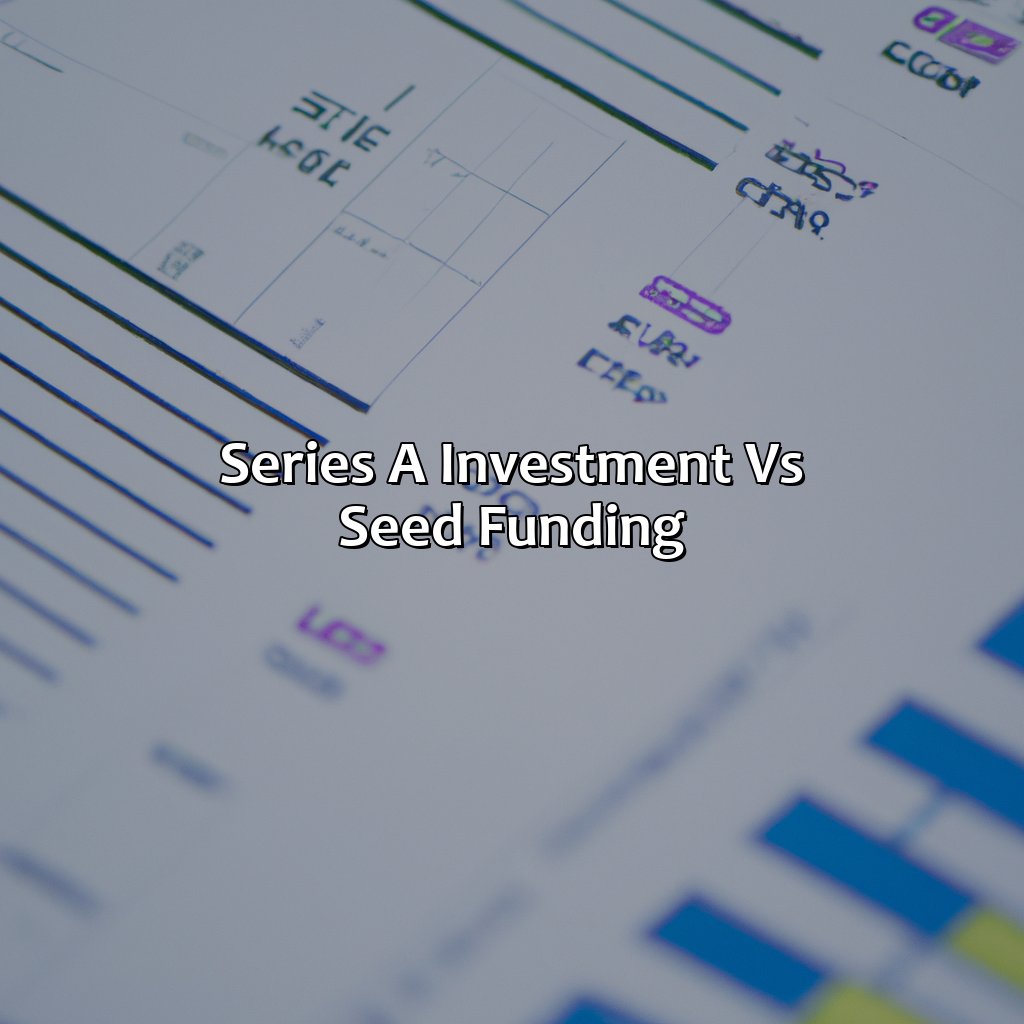What Is Series A Investment?
Key Takeaway:
- Series A Investment is the initial funding round for a startup after the seed round, typically aimed at scaling up the business and expanding the product or service offerings.
- Key characteristics of Series A Investment include a larger funding amount than seed funding, a higher company valuation, and more involvement from investors in terms of board seats and decision making.
- During the Series A funding round, startups should prepare for the due diligence process and be able to showcase their team, product, and growth potential to investors. Pitching to Series A investors requires a solid business plan, long-term vision, and a compelling story that resonates with investors.
3 Key Takeaways on “What is Series A Investment?”:
1. Series A Investment is the second round of funding that a startup can receive after the seed round, aimed at scaling the business and expanding the product or service offerings.
2. Key characteristics of Series A Investment include a larger funding amount, higher company valuation, and more investor involvement in decision-making.
3. To prepare for Series A funding, startups must showcase their team, product, and growth potential to investors and craft a compelling business plan and long-term vision.
Struggling to understand what Series A investment means and why is it so important? You’re not alone! This article will provide you with key information about Series A investment and how it can benefit companies. Get ready to learn more about how this crucial step can help secure your business’ future.
Series A Investment: What it means
A Series A investment is a funding round for a startup after initial seed funding. It typically involves VC firms and angel investors investing in the company. This investment helps to fund the company’s growth, expand the team, and further develop the product or service. This type of funding comes with a valuation of the company, giving investors equity. It is considered a critical phase in the startup’s journey before reaching profitability.
Series A funding is crucial for startups to scale and become sustainable. It is a milestone that can make or break a company’s future success. At this stage, startups have validated their product-market fit and have a proven track record of generating revenue. It is usually a high-risk high-reward investment, where investors aim to maximize their returns through the company’s future success.
One unique aspect of Series A investment is that investors look beyond the product or service, focusing on the team’s ability to execute and grow the company. It involves a rigorous due diligence process that analyzes the startup’s financials, market potential, competition, and growth strategy. Investors play an active role in supporting the company, providing expertise, guidance, and management support.
According to Pitchbook, the largest Series A funding deal was for the biotech company Moderna, which raised $450 million in 2015.

Image credits: retiregenz.com by James Arnold
Key Characteristics of Series A Investment
Series A investments are important to understand. To make informed decisions, one must check funding amount, valuation, and investor involvement. To comprehend their significance, let’s dive deeper into these sub-sections. How do they affect Series A investments?

Image credits: retiregenz.com by Yuval Jones
Funding Amount
A Breakdown of Investment Sum
Series A funding amount varies with each company but typically ranges between $2 million and $15 million. This funding allows growing businesses to increase their sales, expand their operations, and create new products that help them stay competitive.
Below is a table that outlines investment sums for various stages of financing:
| Stage | Funding Amount |
|---|---|
| Seed | Less than $1M |
| Series A | $2M – $15M |
| Series B | $10M – $60M |
| Series C+ | More than $100M |
In addition to an influx of capital, companies receiving Series A investments often gain access to business expertise from investors that can help navigate challenges and capitalize on unseen opportunities.
Pro Tip: Raising capital is a vital aspect of growing any business. Before meeting with potential investors, prepare a detailed business plan and be ready to clearly articulate why your company is worth investing in. They say money talks, but in Series A investment, it’s more like numbers speak louder than words.
Valuation
The methodical and judicious assessment of a company’s overall worth or its potential future growth prospects refers to the process of determining its market valuation. In Series A Investment, the pre-money valuation of a company is determined before any external funding is added, which highlights the significance of accurate market valuation. By providing venture capitalists with an idea of the worthiness and potential profitability of investing in a particular startup, correct valuation encourages sound investment decisions.
Foreseeability and reliability are important factors in determining an accurate market valuation, which depends on many variables such as investors’ view on future revenue projections, previous financial performance or industry benchmarks. As valuing a new startup can be very difficult due to limited data points, entrepreneurial experience and intuition factor play important roles in determining valuation.
Series A investments rely significantly on proper diligence when assessing valuations as overvaluing can have dangerous implications that impact stakeholder returns down the road. Although changes and fluctuations in market conditions may affect initial valuations, it is essential to maintain practical expectations to establish fair deals and avoid investor dissatisfaction while nurturing trust through transparency.
According to Forbes.com (2020), the global estimated value for Series A investment funds was around $40 billion in 2019.
Get ready for some serious investor involvement, like a nosy neighbor who always wants to know what’s going on in your business.
Investor Involvement
Investor Participation is an integral component of Series A Investment. In this funding round, investors become more involved in the company’s operations and management decisions, and they are usually on the board of directors.
They will provide valuable advice to the founders, participate in decision-making processes, and ensure that their investments are protected. Additionally, they may assist with finance strategy, recruitment recommendations and product development plans.
The involvement of investors enhances the overall performance of a startup since they can offer assistance beyond just creating connections that may aid in fundraising; it serves as an added bedrock for success.
It’s no secret that companies have struggled with investor participation levels long after closing up to funding deals- when professionals engage over collaboration instead of micromanaging founders’ dreams and important growth opportunities together.
Get ready for the shark tank, because Series A funding is where the big fish come to play.
What to Expect During Series A Funding Round
Prepping for a Series A funding round? This guide is here to help! It provides a deep insight into the different sub-sections of the process. Get ready for prepping and pitching to potential investors.
With this info, you’ll be confident as you sail through Series A investment.

Image credits: retiregenz.com by Adam Washington
Preparing for Series A Funding
Taking your startup to the next level? Here’s how to ready yourself for securing Series A funding. Start by intensifying your market research, analyzing your financials and optimizing operations. Investors scrutinize metrics like user growth, customer acquisition costs and revenue per user before deciding on investment opportunities.
During the Series A funding round, having a clear pitch deck that shows business progress in addition to a thorough financial analysis is crucial for success. Additionally, startups will likely face negotiations over valuation and equity with investors which require careful consideration.
Finally, establishing strong networks with industry players and seeking counsel from seasoned entrepreneurs can help you navigate the complexities of Series A fundraising more effectively.
According to Crunchbase News, “Venture capitalists invested nearly $60 billion in the US during Q2 2021, marking a new all-time high”.
Pitching to Series A investors is like performing heart surgery on a rollercoaster – it’s risky, stressful, but if successful, a real thrill ride.
Pitching to Series A Investors
When it comes to attracting Series A investors, you need to be strategic in your approach. Start by identifying the right investors who are interested in your industry and stage of growth. Make sure your pitch is clear, concise, and highlights your unique selling proposition. Be prepared to answer tough questions about your financials, team, and market opportunity. Demonstrating progress towards key milestones can also increase your chances of securing funding.
To stand out from the competition, focus on building relationships with potential investors before you actually need the funding. Attend networking events or seek warm introductions through people in your network. This can help establish trust and credibility early on.
Another important consideration is determining how much money you actually need and what you plan to use it for. Having a clear plan for how the funding will be used can make investors more confident in their decision to invest.
Overall, successfully pitching to Series A investors requires careful preparation and a strategic approach. With proper planning and execution, you can increase your chances of securing funding for your startup.
Don’t miss out on potential investment opportunities by not being adequately prepared when presenting to Series A investors. Utilize these tips and strategies to ensure that you put forth your best pitch to secure the necessary funding for business growth.
Why settle for a seed when you can reap the benefits of a fully grown series A investment?
Series A Investment vs. Seed Funding
In the world of business funding, understanding Series A investment and seed funding is critical for entrepreneurs. Series A investment follows seed funding and is for companies looking to expand their business.
A comparison table of Series A investment and seed funding:
| SERIES A INVESTMENT | SEED FUNDING |
|---|---|
| The company has a defined product or service | The company is in its early stages of development |
| Proof of concept has been established | Proof of concept is yet to be established |
| Typically raises $2-10 million | Typically raises less than $2 million |
| Investors take an equity stake | Investors can take a convertible note |
| Used for expanding the company, hiring, marketing and other resources | Used for product development and testing |
An interesting detail is that Series A investment takes more time and effort than seed funding as the investors expect a higher return on investment.
A true fact is that the average Series A funding for a start-up company is $12 million, according to research conducted by PitchBook.

Image credits: retiregenz.com by Harry Duncun
Series A Investment vs. Series B Investment
To Understand Series A vs. Series B Investment, we compare the stages of startups with their capital investment. Here is a table that explains the key differences.
| Series A Investment | Series B Investment |
| Occurs after seed-stage funding | Occurs after Series A funding |
| Investment range is between $2m – $15m | Investment range is between $10m – $100m |
| Use of capital for product development and expansion | Use of capital for scaling and market expansion |
| Investors may receive convertible preferred stock | Investors may receive a combination of preferred and common stock |
One key point to note is that startups have to raise funding in stages to achieve stability and growth. Series A funding is typically a startup’s first significant round of funding, which helps to establish the company’s value and direction. Series B funding is typically raised when the company has demonstrated a reliable customer base and the ability to execute successfully.
The history of Series A and B investments dates back several decades when venture capitalists started investing in new startups. It has since become a ubiquitous practice for early-stage startups. Through strategic fundraising at different stages, startups can secure the necessary funding to build and grow their business without the burden of excessive debt.

Image credits: retiregenz.com by Yuval Duncun
Advantages and Disadvantages of Series A Investment
In the world of investments, Series A investment is crucial for startups planning to expand. Here’s a glimpse of the pros and cons of Series A investment.
Advantages:
- Increased funding for business expansion
- Expert guidance and networking opportunities with investors
- Increased company valuation and potential for future investments
Disadvantages:
- Loss of control with diluted equity
- Pressure to meet investor expectations and aggressive growth goals
- Potential conflicts with investors regarding business decisions
Notably, founders need to assess their requirements and company values before opting for Series A investment.
A recent study by Crunchbase showed that in 2020, the total global Series A funding was $63.2 billion, with North America leading the way with $34 billion of Series A funding.

Image credits: retiregenz.com by Yuval Woodhock
Some Facts About Series A Investment:
Series A investment is typically the first round of funding a startup receives after seed funding. (Source: Investopedia)
The purpose of Series A funding is to provide capital for a startup to scale and grow its business. (Source: Entrepreneur)
Series A investors typically receive equity in the company in return for their investment. (Source: Forbes)
Series A rounds often range from $2 million to $15 million in funding. (Source: TechCrunch)
Series A investment typically occurs when a startup has validated its product or service, and has begun to generate revenue. (Source: TechRepublic)
FAQs about What Is Series A Investment?
What is Series A investment?
Series A investment is the first significant round of investment that a start-up receives from venture capitalists or angel investors.
What is the purpose of a Series A investment?
The purpose of a Series A investment is to provide funding for a start-up in order to help it scale. The funds are typically used to hire key employees, develop products, and expand the business.
How much money is typically raised in a Series A round?
The amount of money raised in a Series A round can vary, but it is typically between $2 million and $15 million.
What do investors usually expect in return for a Series A investment?
Investors usually expect equity in the company and a seat on the board of directors. They also expect the company to grow and eventually have a successful exit, either through an acquisition or an IPO.
How does a start-up prepare for a Series A round?
A start-up typically prepares for a Series A round by creating a solid business plan, developing a minimum viable product, and establishing traction with customers. They also need to have a strong team in place, including key hires such as a CFO and CTO.
What are the risks involved in a Series A investment?
As with any investment, there are risks involved in a Series A investment. The start-up may not be able to execute on their business plan, or they may not be able to achieve the growth projections that were presented to investors. There is also a risk that the market may not respond to the company’s product or service as anticipated.
 Checkout this IRS Loophole
Checkout this IRS Loophole 
